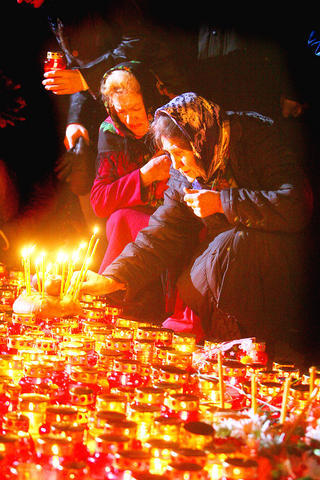Holding candles, thousands of people from all over Ukraine gathered on Saturday on a square in Kiev to mourn the millions who died of starvation in a famine engineered by the Soviet authorities 75 years ago.
Ukrainian President Viktor Yushchenko, speaking to the crowd, once again called on the international community to recognize the Holodomor -- or death by hunger -- as an act of genocide.
"We neither overestimate nor underestimate the scale of this grief," he said.

PHOTO: AFP
Looking out on a sea of light blue and yellow national flags adorned with strips of black cloth, the president called for the removal from Ukrainian territory of all monuments to the totalitarian Soviet regime.
Accounts of the great famine, long kept secret by Soviet authorities, still divide historians and politicians, not just in this nation of 47 million but throughout the former Soviet Union.
Some are convinced that the famine targeted Ukrainians as an ethnic group. Others argue authorities set out to eradicate private landowners as a social class and that the Soviet Union sought to pay for its rapid industrialization with grain exports at the expense of starving millions of its own people.
The dictator Josef Stalin's collectivization drive affected the entire Soviet Union, but was particularly calamitous for Ukraine with its rich agricultural land.
"My grandfather had to bury grain and mushrooms deep in a forest and draw maps to find it later," said Polina Stasyuk, 23, a student from Kiev who attended the gathering. "They had to lead their chimney into the cellar, so that villagers could not smell food when my grandma was cooking."
Each village was ordered to provide the state with a quota of grain, but the demands typically exceeded crop yields. As village after village failed to meet the requirements, they were put on a blacklist. The government seized all food and residents were prohibited from leaving -- effectively condemning them to starvation.
Yushchenko estimates 10 million Ukrainians died in the famine of 1932 to 1933. Stanislav Kulchitsky, a Ukrainian historian, believes the number is closer to 3.5 million.
"Our family wouldn't have survived but for my grandfather. He lived in a village and secretly supplied the family, which lived in Kiev, with potatoes," said Serhiy Derevinsky, 58, holding a picture of his grandfather and a candle.
Earlier in the day, Yushchenko and his family attended a religious ceremony and planted bushes at a memorial site. They were joined by other Ukrainian politicians and both post-Soviet former presidents.
The Ukrainian parliament has already labeled the famine genocide. So has the US and some other countries. But Russia, the legal successor to the Soviet state, resists the label, insisting the famine also hit other groups, including Russians and Kazakhs.

VAGUE: The criteria of the amnesty remain unclear, but it would cover political violence from 1999 to today, and those convicted of murder or drug trafficking would not qualify Venezuelan Acting President Delcy Rodriguez on Friday announced an amnesty bill that could lead to the release of hundreds of prisoners, including opposition leaders, journalists and human rights activists detained for political reasons. The measure had long been sought by the US-backed opposition. It is the latest concession Rodriguez has made since taking the reins of the country on Jan. 3 after the brazen seizure of then-Venezuelan president Nicolas Maduro. Rodriguez told a gathering of justices, magistrates, ministers, military brass and other government leaders that the ruling party-controlled Venezuelan National Assembly would take up the bill with urgency. Rodriguez also announced the shutdown

Civil society leaders and members of a left-wing coalition yesterday filed impeachment complaints against Philippine Vice President Sara Duterte, restarting a process sidelined by the Supreme Court last year. Both cases accuse Duterte of misusing public funds during her term as education secretary, while one revives allegations that she threatened to assassinate former ally Philippine President Ferdinand Marcos Jr. The filings come on the same day that a committee in the House of Representatives was to begin hearings into impeachment complaints against Marcos, accused of corruption tied to a spiraling scandal over bogus flood control projects. Under the constitution, an impeachment by the

Exiled Tibetans began a unique global election yesterday for a government representing a homeland many have never seen, as part of a democratic exercise voters say carries great weight. From red-robed Buddhist monks in the snowy Himalayas, to political exiles in megacities across South Asia, to refugees in Australia, Europe and North America, voting takes place in 27 countries — but not China. “Elections ... show that the struggle for Tibet’s freedom and independence continues from generation to generation,” said candidate Gyaltsen Chokye, 33, who is based in the Indian hill-town of Dharamsala, headquarters of the government-in-exile, the Central Tibetan Administration (CTA). It

A Virginia man having an affair with the family’s Brazilian au pair on Monday was found guilty of murdering his wife and another man that prosecutors say was lured to the house as a fall guy. Brendan Banfield, a former Internal Revenue Service law enforcement officer, told police he came across Joseph Ryan attacking his wife, Christine Banfield, with a knife on the morning of Feb. 24, 2023. He shot Ryan and then Juliana Magalhaes, the au pair, shot him, too, but officials argued in court that the story was too good to be true, telling jurors that Brendan Banfield set